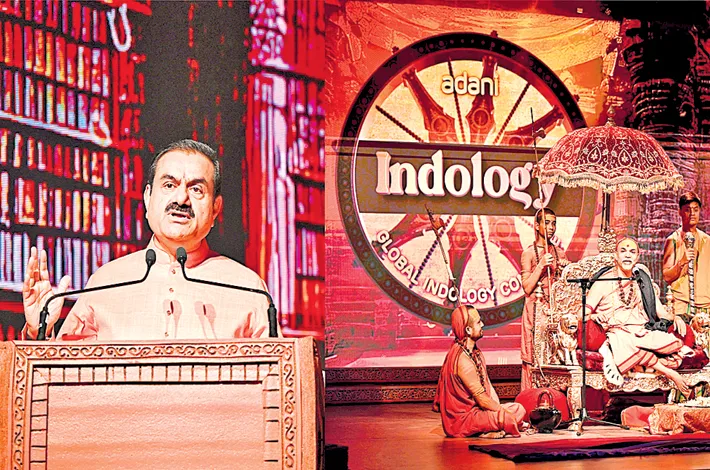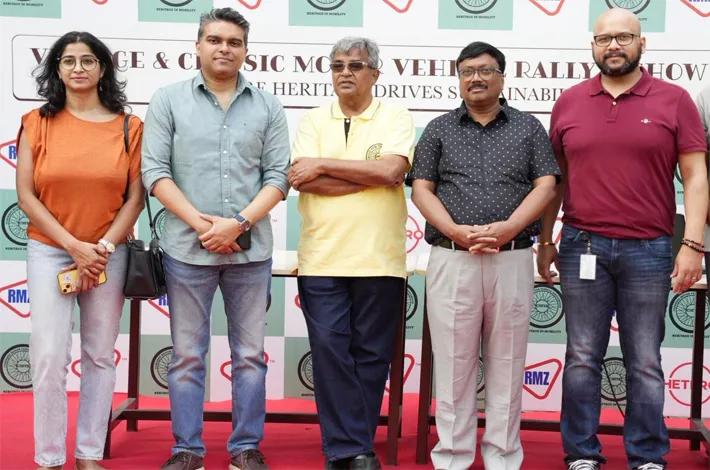AI should serve, not supplant: Gautham Adani
23-11-2025 12:00:00 AM

Preserving India's Ancient Wisdom in the Age of AI at Global Indology Conclave
In a resounding address that blended philosophical depth with urgent modern warnings, Adani Group Chairman Gautam Adani took center stage at the Adani Global Indology Conclave 2025, urging India to fortify its civilizational heritage against the subtle encroachments of artificial intelligence. Held at the Adani Corporate House here from November 20 to 22, the three-day gathering—organized in collaboration with the Ministry of Education's Indian Knowledge Systems (IKS) division—drew scholars, policymakers, and global thinkers to revive the study of Indology amid a world increasingly dominated by algorithmic narratives. Adani's speech, delivered on the conclave's final day, not only highlighted India's economic ascent but also announced a landmark Rs 100 crore pledge, positioning corporate India as a guardian of ancient wisdom.
The conclave, themed around "Digitise, Decode, Defend: Reclaiming India's Knowledge Heritage," comes at a pivotal moment. With Indology departments dwindling worldwide and AI reshaping how societies access history, the event sought to reintegrate India's philosophical, scientific, and cultural legacies into contemporary education, aligning with the National Education Policy (NEP) 2020. Over 200 participants, including academics from IITs and IIMs, engaged in sessions on Paninian grammar, ancient astronomy, indigenous healthcare, and classical literature. But it was Adani's keynote that electrified the room, transforming a scholarly forum into a clarion call for national self-preservation.
Adani began with a poignant reflection on his upbringing, crediting his mother's bedtime tales from the Ramayana and Mahabharata for instilling timeless values. "My mother used to narrate episodes from Ramayana and Mahabharata, including Lord Ram's 14 years of exile, the devotion of Maa Sita," he recalled, his voice steady yet evocative. From these stories emerged lessons in duty, devotion, and dharma—principles that, he argued, have propelled India's resurgence. Arjuna's doubts on the battlefield, quelled by Krishna's counsel to transcend personal ties for a higher purpose, mirrored the nation's own journey from colonial subjugation to global prominence. "When a civilisation knows who it is, its economy knows where it must go," Adani declared, linking cultural rootedness to India's status as the world's fourth-largest economy and fastest-growing major powerhouse over the past decade.
This economic narrative, however, served as a prelude to Adani's core admonition: the perils of unchecked technological progress. He painted AI not as a mere tool but as a "quiet thief of identity," an insidious force executing "new forms of invasions" without armies or flags.
"They seek something far more powerful—our attention, habits, and imagination," he warned. In an era where AI acts as "the world's new teacher, the guide to our past and the keeper of our civilisational memory," Adani cautioned that without vigilant defense, human behavior would yield to "the cold logic of the machine’s algorithms." This shift, he emphasized, would be "silent, gradual," eroding how Indians feel, learn, and perceive their own history.
Drawing parallels to historical traumas, Adani evoked the sacking of Nalanda and Vikramshila universities—acts of "psychological war" that shattered civilizational confidence. "Our knowledge was seamlessly stolen and ruthlessly mined. Civilisations do not fall by sword alone. They fall when their memories are left unguarded," he said. Colonial narratives further compounded this by dismissing Indian sciences as mere mythology, leaving a legacy of self-doubt. Yet, Adani's tone was one of defiant optimism: "Our civilisation that refuses to break is also the one that learns how to build." Indology, he posited, is no nostalgic retreat but a forward march. "When we study Indology, we do not look back to live in history, we look forward so that the best of history lives through us."
At the heart of his vision lies the imperative to "digitise, decode, defend" Vedic and Indic knowledge systems. Adani dissected AI's triple threats: invisibility, through "data gravity" that erases undigitized archives; cultural compression, where large language models flatten the layered commentaries of texts like the Vedas, stripping away context and nuance; and alien judgment, as Western-biased models mislabel Vedic practices as "harmful" folklore. "Indic knowledge is layered with commentary and context, but large language models flatten meanings. Once its context dies, culture dies," he explained. To counter this, he advocated for an India-centric corpus, human-AI symbiosis via scholar oversight, and transforming colleges into "new Nalandas" fusing ancient insight with innovation.
The speech's crescendo arrived with Adani's announcement: a ₹100 crore founding contribution to the Bharat Knowledge Graph, a digital scaffold connecting India's texts, timelines, and ideas for AI-era accessibility. This funding will back 14 PhD scholars in linguistics, astronomy, heritage studies, and traditional sciences, blending modern tools like Python with Sanskrit proficiency. "As a beginning, I am humbled to announce a founding contribution of ₹100 crore towards building the Bharat Knowledge Graph and supporting the scholars and technologists who will contribute to this Indology mission. This is the repayment of a civilizational debt," he stated, invoking the ethos of Vasudhaiva Kutumbakam—the world as one family—to amplify India's soft power.
The pledge elicited immediate applause and endorsements. IKS Division Head Dr. R.L. Shrivastava hailed it as a "game-changer for knowledge sovereignty," while IIT Delhi's Prof. Sanjay Sarma noted its potential to "decolonize AI datasets." Corporate peers, including representatives from Tata and Reliance, signaled interest in collaborative funding, hinting at a burgeoning Indology Mission. Adani urged businesses to join, framing it as nation-building: "When the roots of culture fade, the land turns dry and barren, but as long as values remain, darkness can never dare."
Beyond the conclave's walls, Adani's words resonate amid global debates on tech ethics. With India poised to lead AI adoption—projected to contribute $500 billion to GDP by 2025—his emphasis on cultural firewalls challenges the West's dominance in model training. Critics, however, question the feasibility: Can a corporate-led initiative truly safeguard diverse Indic traditions without state oversight? Adani dismissed such concerns, asserting that true dharma demands action from all quarters.
As delegates dispersed into Ahmedabad's bustling streets, the conclave leaves a tangible legacy. Resolutions include establishing Indology AI chairs at premier institutions and a five-year research roadmap on sustainability drawn from ancient texts.
For Adani, whose empire spans ports to renewables, this foray into intellectual stewardship underscores a broader philosophy: India's future hinges not just on steel and silicon, but on the unyielding spirit of its sages.
In reclaiming Indology, Adani envisions a Bharat where AI serves, not supplants, the soul of a 5,000-year-old civilization. As he concluded, echoing Krishna's Gita: Rise beyond doubt, for dharma endures. The conclave may end, but the mission—to ensure history lives through us—has only just begun.
My mother used to narrate episodes from Ramayana and Mahabharata, including Lord Ram's 14 years of exile, the devotion of Maa Sita.
Gautam Adani Adani Group Chairman








